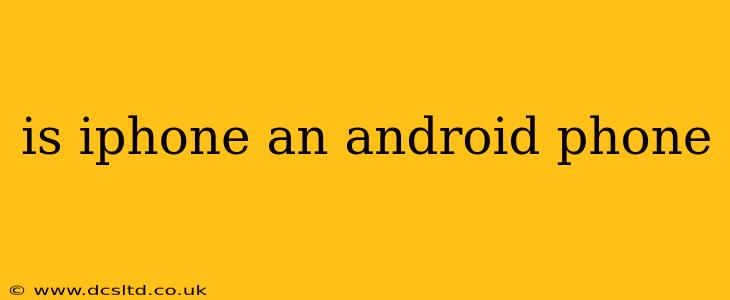Is iPhone an Android Phone? A Clear Distinction Between iOS and Android
No, an iPhone is definitely not an Android phone. This is a fundamental difference in the mobile phone world. While both iPhones and Android phones are smartphones, they operate on completely different operating systems (OS). Understanding this distinction is key to appreciating the unique features and experiences each platform offers.
Let's break down the core differences:
What is an Android Phone?
Android is an open-source operating system developed by Google. This means that many different manufacturers (like Samsung, Google, OnePlus, etc.) can use and customize Android for their phones. This leads to a wide variety of phone models, designs, and price points, all running on the Android OS. The flexibility of Android allows for extensive customization, and users often have more control over their device's settings and features.
What is an iPhone?
An iPhone is a smartphone manufactured by Apple and runs on Apple's proprietary operating system, iOS. Unlike Android's open-source nature, iOS is strictly controlled by Apple. This results in a more consistent user experience across all iPhone models, with a strong emphasis on simplicity and user-friendliness. Apple tightly integrates its hardware and software, leading to a highly optimized ecosystem.
What are the Key Differences Between iOS and Android?
The core difference lies in their operating systems:
- Operating System: iPhones use iOS; Android phones use Android.
- Manufacturer: iPhones are solely manufactured by Apple; Android phones are manufactured by various companies.
- App Ecosystem: While both platforms have vast app stores (Apple's App Store and Google Play Store), the apps themselves, and their availability, can vary.
- Customization: Android offers extensive customization options, allowing users to personalize their home screens, widgets, and launchers. iOS offers less customization, focusing on a streamlined and intuitive user experience.
- Pricing: Generally, Android phones offer a wider range of price points, from budget-friendly options to high-end flagships. iPhones tend to be positioned at the higher end of the price spectrum.
What are the advantages of each platform?
- Android Advantages: Greater flexibility and customization, wider range of price points, and a more open ecosystem.
- iOS Advantages: Known for its user-friendliness, simplicity, security, and seamless integration within the Apple ecosystem.
Which operating system is better?
The "better" operating system is entirely subjective and depends on individual preferences and needs. Some users prefer the simplicity and security of iOS, while others value the flexibility and customization options offered by Android.
This clarifies the fundamental difference: iPhones use iOS, while Android phones use Android. They are distinct and separate platforms, not interchangeable.
